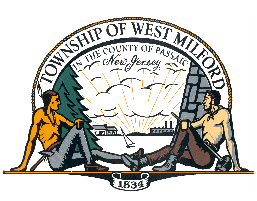News
News items are listed in the sequential order of their release posting dates.
This information may be in a PDF printable format for printing only.
With FREE Adobe Reader® software, you can view and print Adobe PDF files.
Please select a year.
MRSA and Frequently Asked Questions
Township of West Milford
Department of Health – Nursing Division
1480 Union Valley Road, West Milford, NJ 07480-1303
(973) 728-2725/6 Fax: (973) 728-2723
MRSA
Recent news stories have reported incidences of MRSA. What is MRSA? How is it spread? How can it be treated? Should you worry?
MRSA stands for methicillin-resistant Staphylococcus aureus, which is a type of “Staph" bacteria. Staph bacteria are one of the most frequent causes of skin infection in the U.S. Most of the time these skin infections are minor, but Staph can also cause serious infections. MRSA is almost always spread by direct physical contact. The bacteria DOES NOT spread through the air. MRSA can also spread when people come in contact with objects that have been contaminated with the bacteria. These objects include towels, clothing, bedding, gym or sports equipment, soiled bandages, bars of soap, contaminated surfaces, etc.
When a person has been infected with a MRSA skin infection, it often appears as a boil or an abscess. It might also infect a surgical wound. In either case, the area would be swollen, red, painful and/or pus filled.
There are cases occurring throughout New Jersey, just like there are cases occurring throughout the rest of the country. Approximately, 30% of the general population is colonized with MRSA which means the “Staph” bacteria can live in their nose or on their skin without causing an infection. Because of this it is expected that we will see a certain number of MRSA cases in NJ, just like the rest of the country and throughout the world.
MRSA can be treated! It is resistant to certain types of antibiotics, which makes it more difficult to treat, but there are other antibiotics that are still able to kill the MRSA bacteria. Treatment may also include draining the boil/abscess by a healthcare provider. If an antibiotic is prescribed, it is critical to TAKE ALL antibiotics, even if the infection is getting better. Don’t share antibiotics with other people or save unfinished antibiotics for use at another time.
For more information on MRSA, please visit the New Jersey Department of Health and Senior Services (NJDHSS) at http://nj.gov/health/cd/mrsa/ or the Centers for Disease Control and Prevention (CDC) at http://www.cdc.gov/ncidod/dhqp.
If you have additional questions, contact the West Milford Health Department at 973-728-2725 or their website at www.westmilford.org.






 Online Tax Payments
Online Tax Payments
 Community Services & Recreation
Community Services & Recreation
 Public Safety
Public Safety
 Emergency Information
Emergency Information
 Meetings & Minutes
Meetings & Minutes
 Forms & Documents
Forms & Documents
 Service Request
Service Request
 FAQs
FAQs
 Links
Links
 Contact Us
Contact Us




